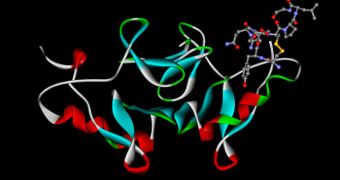Researchers now believe that the hormone oxytocin could help doctors address some of their patients' psychiatric illnesses. The substance was never used for this type of applications before.
Thus far, it was only used in the field of obstetrics, where administering it can induce labor and make it easier, and also aid new mothers with breastfeeding. Generally, in the human body, the chemical contributes to forming social bonds, and also to people's ability to trust others.
In fact, it is so well specialized for doing this that it earned for itself the name the “love hormone.” Scientists now believe it could be used to treat conditions such as schizophrenia, post-traumatic stress disorder (PTSD) and anxiety.
Investigators say that therapies using this hormone could also be used to improve the social abilities of people living with autism. These individuals cannot readily interact with others, especially in groups.
Around the world, numerous research teams are working on including oxytocin in common therapies, and thus far a fairly large number of clinical trials was set up, with encouraging results.
“The idea of augmenting […] the way we connect to and with each other, would just be so helpful for so many people,” explains University of California in San Diego (UCSD) adjunct professor of psychiatry Dr. Kai MacDonald.
The researcher, who has been studying the role that oxytocin may play in treating schizophrenia, says that he obtained some fairly interesting results, but adds that the conclusions aren't by far revolutionary.
One of the things that proves to be very difficult in this line of research is the detecting the correct dosage and timing for administering oxytocin doses. The molecule is rapidly degraded in the stomach and the blood.
It also does not cross the blood-brain barrier, and so MacDonald and his team are having a hard time setting up a therapy revolving around the love hormone.
“If we could do it with any degree of precision, that would be a lovely therapeutic venue,” the team leader explains. He adds that mice, dogs and monkeys alike respond in the same manner to oxytocin.
“The field of treating schizophrenia is kind of at an impasse. All our drugs that we have to date work through the same mechanisms as they did when antipsychotic drugs were first discovered 50 years ago,” says David Feifel.
“We are in desperate need of novel mechanisms that will improve symptoms through a different pathway, and oxytocin clearly is a novel mechanism,” adds the study researcher, who is also based at the university.
One of the most important effects of oxytocin, and also one of the main reason why experts want to use it so badly, is that is controls and subdues the actions of the amygdala, a brain nucleus in charge of controlling fear response.
In turning, quelling the amygdala results in a decrease in the stress and anxiety response of the brain, that is extremely well developed in people with mental illnesses, LiveScience reports.
MacDonald says that people can trigger excess oxytocin boosts in very easy ways. “Given that some of the things that are suspected of triggering oxytocin – massage, [intercourse], touch, eye contact – given that those are uniformly likable, it's hard not to recommend them,” he concludes.

 14 DAY TRIAL //
14 DAY TRIAL //